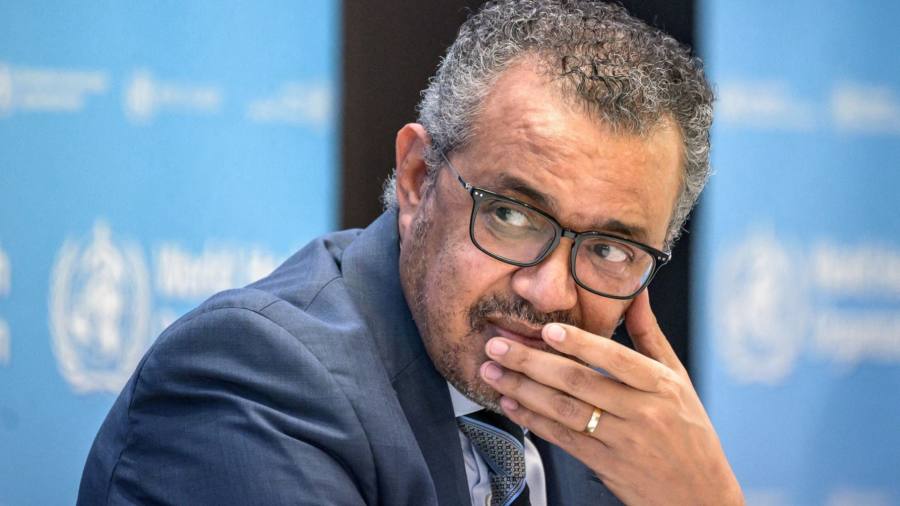The World Health Organization has reinstated two senior managers who were accused of mishandling the biggest sexual misconduct scandal in the UN agency’s history.
Both officials were put on paid leave after being criticised by an independent commission, which investigated instances of rape and exploitation by WHO staff in the Democratic Republic of Congo during an Ebola outbreak five years ago. They returned to work earlier this year.
But the two senior managers named in the report were welcomed back last week, according to an internal email seen by the Financial Times, after a WHO committee concluded “there was no misconduct on their part”.
Julienne Lusenge, the co-chair of the 2021 independent commission, said the decision to reinstate the managers was a “shame”. She noted the WHO had still yet to fully share information on the cases with the DRC so authorities could complete their own investigation.
“The affected populations are under the increasing impression that the international organisations or, better said, its agents, don’t work for them, but rather for themselves,” Lusenge said.
The DRC scandal — during which victims were in some cases raped after being offered work, with some perpetrators refusing to wear condoms — has prompted an apology from Tedros Adhanom Ghebreyesus, the WHO’s director-general.
Some of the victims said they were forced to undergo abortions, sometimes forcibly “by giving them drugs or even injections”. No senior officials at the WHO have lost their jobs in the wake of the scandal, which took place between 2018 and 2020.
The WHO said it was paying for legal aid for 13 cases in local courts and that it was seeking consent from other victims before sharing information with national authorities.
The independent commission’s report criticised how Andreas Mlitzke, the director of the WHO’s compliance, risk management and ethics office, handled the reports of sexual exploitation he had received.
In one instance, Mlitzke asked whether a victim was a “beneficiary” — someone directly under the care of WHO during the period, when an Ebola outbreak was raging. The report found this designation, which meant the person did not qualify as a victim, “misinterpret[ed] the spirit and the letter” of the WHO’s sexual assault policy at the time.
“This wasn’t in the interest of the victims,” Lusenge said. “Their [the WHO’s] definition of beneficiary says it must be a person that benefits directly, so [effectively] someone in bed sick with Ebola . . . That definition is not correct.”
Michel Yao, the director of the office of strategic health operations, was made aware of incidents of sexual exploitation. The independent report said he did not act on them in a timely manner or refer them to more senior colleagues. Yao told the commission he did not have the time to inform his hierarchy directly because of other crises, according to its report.
A WHO committee in April cleared Yao and Mlitzke, taking into account the independent commission’s findings and a separate report, compiled by the UN.
The WHO said “misconduct was not established”. Mlitzke did not respond to a request for comment. Yao referred to answers provided by the WHO and declined to comment further.
Yao and Mlitzke returned to their jobs in February and March, respectively, following the findings of the UN report. “I am pleased to announce that Mlitzke . . . and Yao . . . have returned to their duties at HQ Geneva,” said a recent email from human resources sent to staff. “Please join me in welcoming [them] back to their positions.”
Paula Donovan, head of the Code Blue campaign to end impunity for sexual offences by the UN, called the move “completely predictable”.
She added: “How much more evidence do member states need before they’ll feel obliged to reform these long, costly WHO investigation procedures designed solely to create the appearance of justice and accountability?”
The UN health body has recently been convulsed by a series of sexual scandals and by concerns about its governance. The WHO has vowed to tackle sexual misconduct head on, implementing a zero-tolerance strategy and publishing figures on the reports it receives.
The WHO said it had terminated the employment of “multiple” alleged perpetrators, overhauled its systems and fostered accountability.
Gaya Gamhewage, the WHO official in charge of tackling sexual misconduct, insisted the health body was “really taking this seriously”. “We have taken more disciplinary action in this area of sexual misconduct in the last six months than in the totality of the history of our organisation,” she said.
If you have insight into related issues that could inform our reporting, please contact [email protected]. We want to hear from you.
Read the full article here




